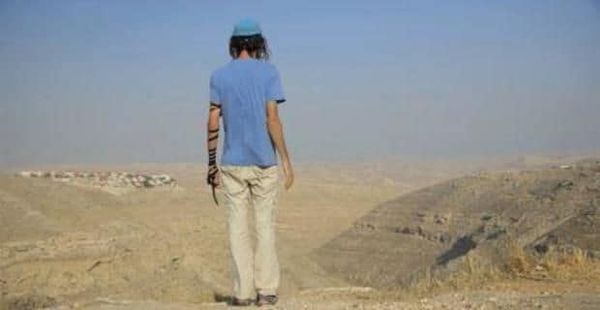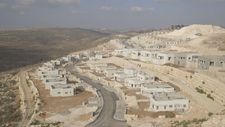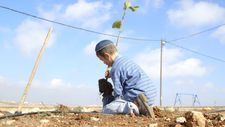 |
| Shimon Dotan: 'It's nothing else than a powder keg. And as often with historic changes, it could blow up overnight. |
"It's a story of conflict, of passion, of envy, of territory - the same elements that feed the Bible," documentarian Shimon Dotan tells me when we meet during Sundance Film Festival to discuss his latest film The Settlers. The Romanian-born filmmaker, who moved to Israel as a child and served in the military there before forging a cinematic career, now lives in New York, where he teaches at CUNY - but still takes a keen interest in Israel "because it's a part of my life it's a part of my identity".
The idea for the film - which traces the settler movement from its origins through to the current day situation - came which he was making his previous documentary Hot House in the region. Travelling to the West Bank in order to meet the families of prisoners that he was speaking to he says it was a single encounter that became the seed of the film.
He said: "I came across a road block that was initiated by the Israeli military to stop settlers from entering a Palestinian area to cause damage there. The military had brought huge, two-tonne cement blocks and would lift them and place them on the road. As they were doing that, there was a demonstration of settlers and I saw a group of young settlers just jumping under the pillar, so half a metre between that and the ground, to stop the military from placing the blocks.
"It was really overwhelming. For one thing, the block was only being held by a wire... and it doesn't take much for it to snap and this level of extremism - madness in a way - was new to me. I read all the events but I just saw it with my own eyes - this outburst of fanaticism. I thought, I have to learn more about it and that's what brought me to think about the settlers as the subject for a new film. At the same time, I find the Israeli settlements on the West Bank and, with them, the ongoing grip of Israel's occupation of the West Bank, is one of, if not the, most meaningful threat to Israel's existence. This is not because of the physical existence but because of the threat of disintegration from within. It's such a dividing element and it creates and erosion of democracy in Israel."
Other films have touched upon the settler issue, including 2005's 5 Days, but this is the first time it has been scrutinised from toe to tip. I tell Dotan that, as I watched the film, I felt as though this was something I'd been waiting to see for several years - an exploration of one of the main issues affecting the region.
Getting settlers representatives to speak to him about their beliefs wasn't too difficult although initially some of the communications experts among them issued what Dotan describes as "a very aggressive email telling them not to talk to me because I was going to defame them or something like that, which I don't think is the case. I love them".
But once the process had begun, he found one person speaking to him often led to another. He added: "At every point I made it very clear that I'm not a proponent of the settler movement - quite the opposite - and I made clear to them that whatever they say, it's going to be a part of the film. I don't think I've had any objections. In most cases, people that have such a big conviction, they are happy to have the opportunity to express it."
Some of the views expressed are hard to hear, however, such as a man who declares himself a racist.
"I couldn't believe it," said Dotan "I couldn't bear for him to say that but he insisted on saying it again and again. That's his core belief."
Speaking about his decision to chiefly speak to the settlers rather than Palestinian residents of the West Bank, he said: "Every work is an exercise in limitations and you have to draw the line somewhere.
"So first of all, this is the settlers. In the very beginning I thought I have to make a film that's only settlers and only their voices, nothing else. As I started working on that it seemed that context was essential. So I thought I'll bring in an historical context. Then when I had been working on it for around two years, I thought, I can't move ahead without having even a limited Palestinian voice in it. So I've two Palestinian characters. One is a human rights activist and lawyer and the other is a Palestinian shepherd. I think even though they have a relatively small part in the film, they do illuminate the relationship between the Palestinians and the settlers."
One of the other surprising aspects to emerge during the course of the films how much economics have begun to drive population movement in the region. There's a shocking moment in the film when you see a road flying over the landscape so that settlers can have an express route back behind the Green Line.
"The number of settlers, estimated at 400,000, is relatively large," said Dotan, "but I would say about 80,000 of those are ideologues, religiously motivated etc. The vast majority are there for practical reasons - it's cheaper to have a house there. This reality is so much stronger than ideology. But if you offer them an alternative it would be easier to move them back behind the Green Line rather than those who are there for ideological reasons."
 |
| 'Most Israelis don't travel to the West Bank. They don't see the volume of construction, the depth of infrastructure' |
I say the film suggests the situation could easily become a powder keg.
"It is a powder keg," he said. "It's nothing else than a powder keg. And as often with historic changes, it could blow up overnight. We have a disparity of 1 to 20 in the economic case and you have the prevention of the population from free movement, from representation. It cannot last.
"There is an ongoing surface of security concern and this security concern has as quality of putting a veil over every reality and that prevents an actual understanding and discussion of the subterranean reality that actually feeds the security concerns. So every government in recent decades thrives out of inflaming the security threat and as long as that is a reality, I don't think things will change. This has to be a political change, it's not a military change. As long as the government won't recognise that this is a potentially catastrophic reality, I don't see much hope."
What he does hope, however, is that his film will make a difference. "I hope two things will happen," he said "One, that there will be a recognition of facts - for many Israelis the film presents a reality that they do not know. Secondly, people tend not to talk about it because it's hard, it's difficult, it's controversial, it puts you in an argument with your family, your friends. So I hope it will bring forward information which we do not have and secondly it will invoke a dialogue which we do not have. I hope that will be my contribution."
The Settlers is screening at the Human Rights Watch Film Festival in March, more details from the website.
Watch an excerpt from the film below.






















